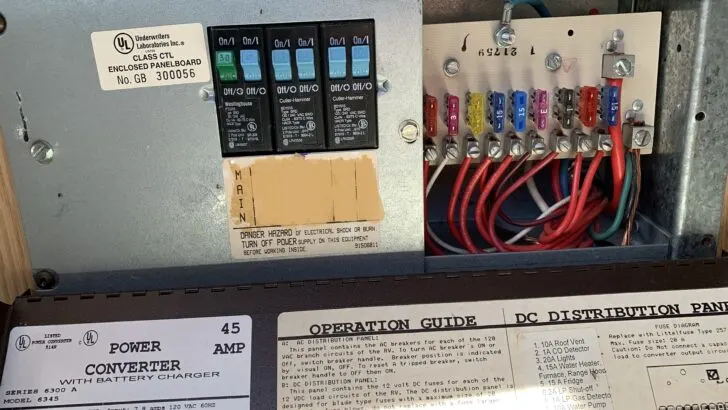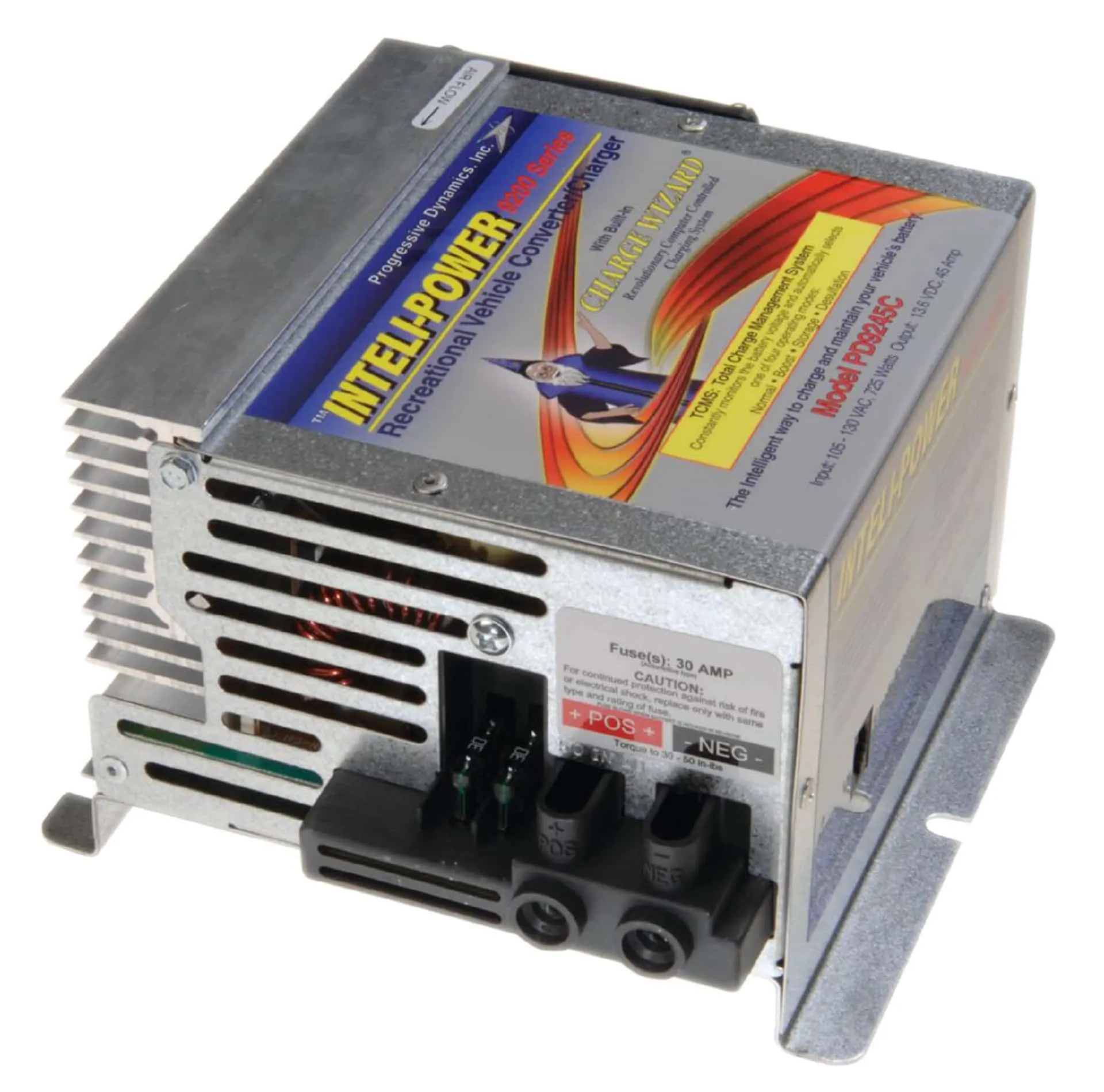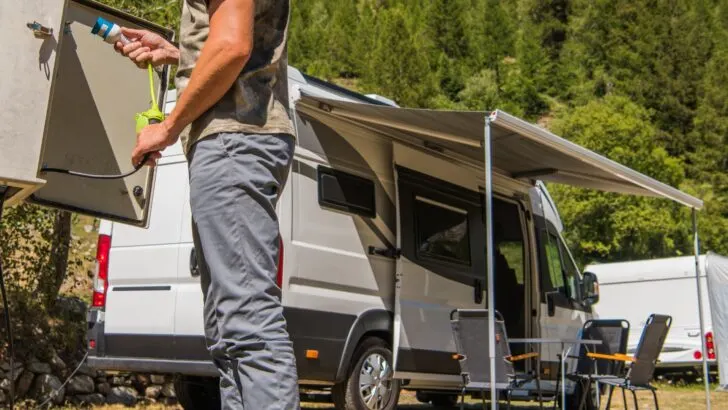Thet terms “RV converter” and “RV battery charger” are often used interchangeably, but what are the differences between an RV converter vs battery charger?
The term “battery charger” is pretty self-explanatory. A battery charger charges your RV batteries. But there’s a bit more to it than that. Likewise, an RV converter charges your rig’s batteries, but it does a whole lot more than that.
So, what are the differences between the two exactly? And do you need both?
- 1) What is an RV Converter?
- 2) What is an RV Battery Charger?
- 3) What Are the Differences Between an RV Converter vs Battery Charger?
- 4) What’s the Difference Between Older Converter/Chargers and Newer Ones?
- 5) What Are Charging Stages?
- 6) Do I Need a Converter/Charger When My RV Is Connected to Shore Power?
- 7) Free RVing Tips, Tricks, Reviews, Giveaways & More
What is an RV Converter?
First, a little history:
When converters were first introduced in the RV market, they didn’t charge the rig’s battery/batteries at all (because in those early days, RVs didn’t even HAVE their own batteries… they relied on the towing vehicle’s battery when connected). Instead, the converter was simply there to convert the 120V AC shore power to 12V DC to power the lights, water pump, vent fans, etc. when the RV was disconnected from its towing vehicle (we’ll dig a little deeper into older vs more modern converters in just a bit).
If you’ve seen our full post on RV power converters, you know that the job of a modern RV converter is to convert 120V shore power to usable 12v DC power and charge your rig’s batteries. This is why, these days, they’re most typically called a “converter/charger” since they include a battery charger along with the ability to convert the 120V AC power in your RV to 12V DC power for the onboard loads.
- Converters 120VAC shore power into usable 12VDC power
- Capable of charging your RV's battery while also powering low voltage lights and appliances
This piece of RV equipment does double duty, providing 12V DC power supply for the electrical loads while connected to shore power AND allowinh your 12V RV batteries to be charged when plugged into shore power. Both functions are critical to keeping your lights, vent fans, appliance electronic control circuits, and some other accessories working, whether you’re hooked up to shore power or while you’re off the grid (not connected to shore power or running a generator).
What is an RV Battery Charger?
As you might glean from the term “battery charger,” an RV battery charger charges your RV’s batteries.
- Victron Energy Blue Smart IP22 12-Volt 15 amp 120VAC with single Output is the new professional battery charger with wireless solution to monitor...
- Victron Energy Blue Smart Charger features a microprocessor controlled adaptive battery management, the adaptive feature will automatically optimize...
Modern RV battery chargers use more advanced, multi-stage charging cycles that are designed to more completely (and efficiently) replace the energy that’s been used from the battery. This has the added benefit of more properly maintaining the health of the battery, increasing it’s service life so it doesn’t need to be replaced as regularly.
Battery chargers can be portable units you can move from one battery to another, stand-alone built-in models (often combined with a separate, dedicated converter module), combination converter/charger units that serve both functions from one device, or even combination RV inverter/chargers.
What Are the Differences Between an RV Converter vs Battery Charger?
The real difference between an RV converter and battery charger is found in their ability to control their output voltage/amperage.
At it’s simplest, a converter supplies amperage at a fixed voltage (typically 13.6 volts) to supply the needed power to onboard loads. However, the output voltage can drop if the power/amperage demand is more than the converter can supply.
Another difference between a converter and a charger is that a converter can sometimes provide a slower charge rate than a charger. However, if it’s left connected for too long, it could overcharge the batteries.
A battery charger, on the other hand, can adjust its output voltage & amperage according to the battery’s state of charge. A good 3-stage charger will cycle its output through each stage in order to provide the most thorough and safe charging, which will extend the battery’s life.
A lot of confusion has come in because of the combination of these two functions into single converter/charger units.
What’s the Difference Between Older Converter/Chargers and Newer Ones?
There’s actually a significant difference between older converter/chargers and more modern ones.
Older converters and chargers (sometimes called “single-stage” chargers) will top up your RV’s batteries while you’re plugged into a power source. They’ll also charge your batteries pretty quickly if you’re running on generator power.

This is an older 2-stage converter charger in a 1998 Roadtrek Class B RV.
However, the efficiency of older units is so poor that they can damage your batteries under certain conditions: for example, if you keep your RV plugged into shore power for very long periods of time, an older single-stage unit can overcharge the battery.
Newer units, on the other hand, charge better and smarter. Not only do they properly charge your RV batteries, they also provide the proper degree of charge, in stages.

This modern 3-stage RV power converter/charger could be a replacement for the 2-stage unit shown above, provider better, smarter, multi-stage charging.
What Are Charging Stages?
RV chargers (or converter/chargers) generally offer 2- or 3-stage charging.
For example, with a 3-stage charger, the charging stages for standard 12V flooded lead-acid batteries are:
Bulk Charging
This is the first stage of charging, which supplies a high voltage & high amperage charge to the battery(ies). This stage generally brings your depleted battery back to 70-80% of its capacity. The bulk charging stage ends when the battery voltage reaches about 14.6V.
Acceptance/Absorption Charging
Once the bulk stage has ended, that 14.6V is held constant while the charger slowly reduces the amperage it’s supplying. This stage returns the remaining 20-30% of depleted battery capacity.
Acceptance/absorption charging ends when the current has been reduced to approximately 1% of the battery’s capacity. (For example, if you have a 100 amp-hour battery, it would be fully charged when the absorption charge current is reduced to 1 amp.)
Float Charging
The float stage begins once the charging amperage drops to a defined target rate (typically down to 1% of the battery bank’s capacity), In this stage, the charging voltage is reduced to 13.6V to maintain the battery’s charge at 100% of its capacity.
Most lead-acid battery manufacturers recommend 3-stage charging as the best and most efficient way to recharge a battery back to full capacity while also extending battery life.
Some older RVs have only 2-stage (bulk & float) converters/chargers. The problem with these is that they never completely charge the battery to its full capacity. This is because, as we noted above, the bulk charging stage can only return about 80% of the depleted charge. Over time, this constant under-charging of the battery leads to sulfation and shorter life.
Another problem with 2-stage chargers is that, because they spend longer in the high-voltage “Bulk” phase, they tend to boil off the water from the battery’s electrolyte solution, leading to more battery corrosion and contributing to reduced battery life (if the battery isn’t properly maintained).
Do I Need a Converter/Charger When My RV Is Connected to Shore Power?
You absolutely do, for several reasons.

You need a working converter/charger AND at least one battery in good condition, even when you’re plugged in to shore power.
First, as we’ve already noted, if you don’t have a working RV power converter (or charger) onboard, your batteries will drain and you won’t be able to use any of your rig’s 12V accessories or appliances. (Remember that some RV appliances like refrigerators, water heaters, and your RV’s propane furnace use 12V power for their control circuitry, even if they’re propane appliances.)
It’s also essential to have at least one battery charged and in good condition in the system to act as a buffer to keep the power provided by the converter/charger “clean”, which is important to the health of the electronics in the system. If your RV battery were dead or inadequately charged, the charger would try to compensate by sending more power to it, which would be hard on the entire electrical system (fluctuations in system voltage due to the different charging stages can cause increased wear on wiring and circuitry). This is why you never want to use any type of RV converter charger without having a good battery connected to the system.
As a final note, if your RV’s converter were to fail and you wanted to temporarily solve the issue until you could replace/upgrade it, you could run to any Walmart or auto part store and buy a portable multi-stage battery charger like this one. At a minimum, it would allow you to continue enjoying your trip without worrying about your batteries dying… at least until you return home and can get the converter/charger repaired.
Free RVing Tips, Tricks, Reviews, Giveaways & More
Subscribe to our daily newsletter! We’ve been full-time RVers for 20 years (!) and share everything we’ve learned about RVing in our daily blog posts. Join our online community to receive a wealth of great RVing knowledge delivered right to your inbox.
Whether this is your first time on the road or you’re a seasoned full-timer, you’ll love the wide range of RVing topics we cover. Don’t miss a single article or any of our famous RV gear Giveaways — Subscribe today!




Tony
Saturday 15th of July 2023
Thanks for the article, guys. Question: What about the latest converter / solar charger on most trailers nowadays? In other words, while in storage, mine has 100-W panel on the roof and a solar controller between it and the two batteries that runs constantly. So when I hook up to shore power, does both the converter and solar controller charge the batteries? Or does one take over?
TheRVgeeks
Saturday 15th of July 2023
Typically, Tony... the solar wiring and charge controller are completely separate from the rest of the RV's 120V AC and 12V DC systems. It operates in parallel with your onboard converter and charger, combined converter/charger, charger and separate inverter, or combined inverter/charger.
There's no harm in the two systems (solar and shore power) operating simultaneously. Both are attempting to bring the battery(ies) up to full charge and will kick out when that happens. Having both operating just means it will happen sooner. ???? In some systems, depending on how they're wired, the charge going to the batteries from one or the other system will raise the voltage that the other system "sees" the battery as being at... which may lead one or the other to kick out sooner. But, again, no harm.
John S.
Friday 14th of July 2023
"Do I Need a Converter/Charger When My RV Is Connected to Shore Power? You absolutely do, for several reasons."
Unless, of course you have a set of RVgeeks-style solar panels on the roof. Then you might be able "to continue enjoying your trip without worrying about your batteries dying…"
I'm just teasing here. I appreciate that you did not want to make this article overly complicated by mentioning your wonderful solar set up.